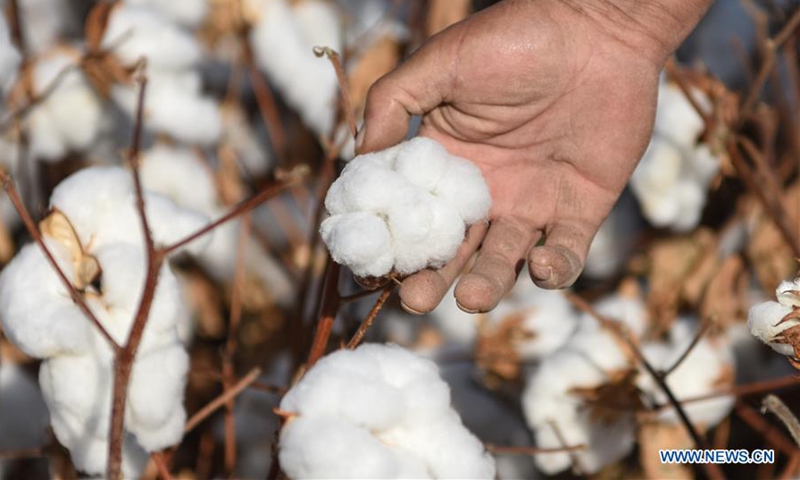MOFCOM hits US’ detention order on Xinjiang’s cotton products
Source: Global Times Published: 2020/12/8 17:07:08

A farmer checks the quality of cotton in a field in Manas County, Hui Autonomous Prefecture of Changji, northwest China's Xinjiang Uygur Autonomous Region, Oct. 17, 2020. A total of 83 mu (5.53 hectares) of cotton in Manas County entered harvest season in this October. (Xinhua/Ding Lei)
The US' claim of the use of "forced labor" in Northwest China's Xinjiang Uygur Autonomous Region to manufacture cotton products is "sheer fiction" and "confuses right and wrong," China's Ministry of Commerce (MOFCOM) spokesperson on Tuesday said, refuting the recent issue of a detention order by the US Customs and Border Protection (CBP).Reaffirming that people living in Xinjiang enjoy "completely the same" working treatment and conditions as people living in other parts of China, the spokesperson said there is no so-called forced labor at all.
Instead, the essence of the affairs in Xinjiang is anti-violence, anti-terrorism, and anti-separatism, the MOFCOM official added.
On December 2, US CBP personnel at all US ports of entry were asked to detain shipments containing cotton and cotton products originating from the Xinjiang Production and Construction Corps, according to a statement by the CBP. The order was the sixth enforcement action that the CBP has announced in the past three months against goods made in Xinjiang.
"In the name of 'human rights,' the US has been hyping the Xinjiang issue, deliberately making excuses to interfere in China's internal affairs and restricting China's normal foreign trade. We express strong dissatisfaction and firm opposition to it," read a statement by the spokesperson, published on the website of the MOFCOM on Tuesday.
As the COVID-19 wreaks havoc worldwide and keeps hurting the global economy, US wrongdoing disturbs normal cooperation between Chinese and US firms and destroys the stability of the global supply chain, the statement said.
China strongly urges the US to stop such mistakes and withdraw its "detention order," vowing to take necessary measures to safeguard the legitimate rights of domestic firms.
Global Times
Posted in: INDUSTRIES